21/10/2016 10:05
Gilka Resende e Rosilene Miliotti¹
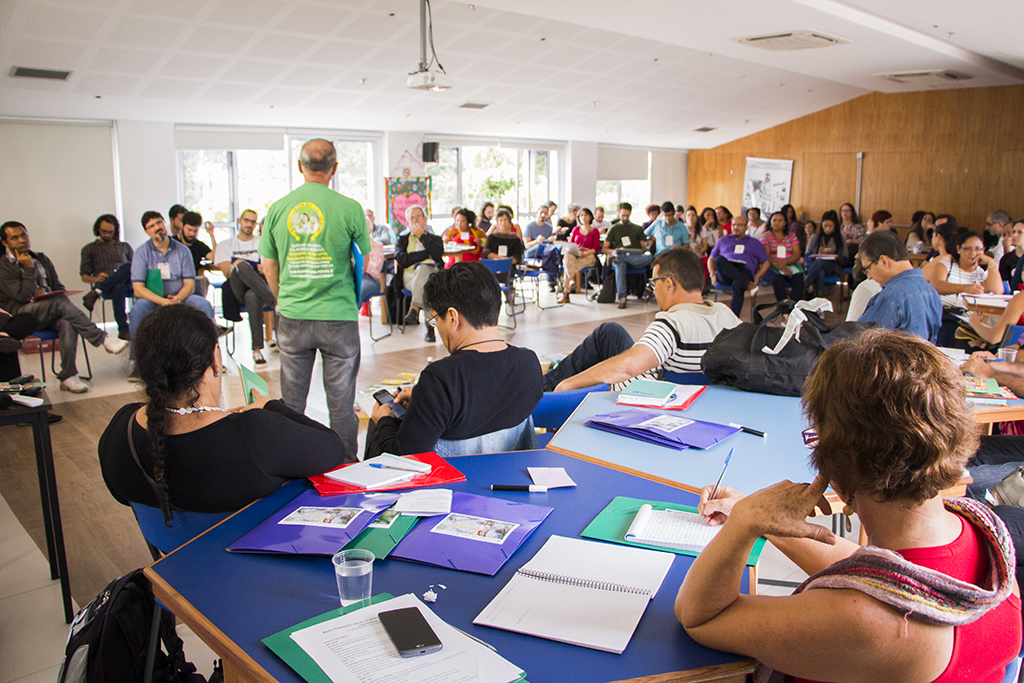
(Photo: Rosilene Miliotti/ FASE)
In response to the growing exploitation of nature and to Brazil’s current political and economic situation, with heightened oppression and dwindling rights, FASE, the Brazilian Environmental Justice Network (RNJA), the Tramas Nucleus, the Gandarela Waters Movement, the Sempreviva Feminist Organization (SOF) and the Research Group on Collective Identities, Territorial Conflicts and Emancipatory Education (IFPR) met in Rio de Janeiro with groups promoting resistance against market logics in rural, urban and forest areas. Over 100 people from 12 Brazilian States and three countries met at the National Seminar on the Commons: A Dialog on Counter-Hegemonic Practices and Knowledge.[2]
On October 4 and 5, 2016, they shared experiences[3] and identified points of convergence among struggles against the privatization of territories and of public services. Julianna Malerba, from FASE’s National Consulting Group (GNA), stressed that ways of life in defense of common goods such as land and water, as well as immaterial goods like knowledge, play a central role in the present context. “This is an important insight into these practices and players, whose lives are being threatened. Common goods are not just things. The ‘commonality’ of goods is an historical construction. It is fundamental that ways of thinking and acting outside individual, commodified patterns be translated and named as common,” she explained.
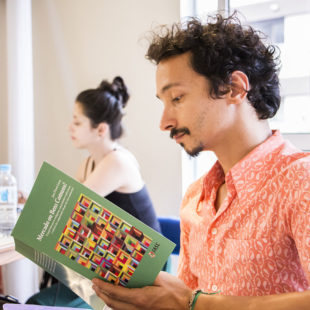
(Photo: Rosilene Miliotti / FASE)
A book by Jean Pierre Leroy, also from FASE, was launched during the seminar: Mercado ou Bens Comuns? – O papel dos povos indígenas, comunidades tradicionais e setores do campesinato diante da crise ambiental (Markets or Commons? – The role of indigenous peoples, traditional communities and sectors of the peasantry in response to the environmental crisis). The book shows that these groups’ resistance struggles prove it is worthwhile and feasible to fight for rights, and that “their knowledge is precious for the future.” In Juliana’s opinion, “Merging political agendas and processes is a strategic response to the inequality, racism and patriarchy that keep many players invisible, along with their needs and with the ways they live, see the world and use natural resources.”
Struggles to defend territories
The discussions revealed that common goods are more than material goods. Mobilizations to put a free or community radio on the air, for example, are common goods, as is the electromagnetic spectrum occupied by broadcasters. Technologies to grow food without pesticides, store water to survive in semiarid regions and occupy urban buildings and empty lots, along with other practices, are also common goods.
Rosimere Nery Peixoto, who coordinates FASE’s program in Pernambuco, has closely monitored rights violated by the SUAPE Industrial Port Complex in the municipality of Cabo de Santo Agostinho. As part of the impacts in several nearby territories, men and women in fishing communities, as well as family farmers, were expelled from their lands. “The company was fined, but the damage was incalculable. People are sick, clinically depressed. Large families living in small houses have no access to land to cultivate,” she explained. For Rosimere, common goods imply basic rights: “A good is only common if it is for everyone, not just for a few or for those who can afford to pay for it.”
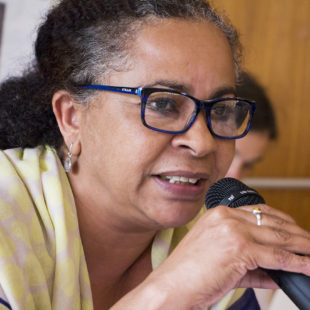
Rosimere Nery
(Photo: Rosilene Miliotti / FASE)
Rudrigo Silva, from the “Ocupe Estelita” movement in Pernambuco, spoke of the importance of mobilizing people and awareness building. “We have consolidated new mobilizing strategies in Recife,” he said. One of the most emblematic experiences was the repossession of the Cais José Estelita settlement in 2014, with repression by the police and the Queiroz Galvão building company. “The company sent its workers to rebuild a wall [isolating the entry gate]. We talked with the masons and told them that, instead of putting up a building there, we could build schools, hospitals and homes. One of the workers came over to me and said we were right. He told me that the day before his son got sick and went to three different hospitals before he saw a doctor,” said Rudrigo, who had taken part in the occupation against real estate speculation. And he concluded: “We have to show that cities offer many unfulfilled possibilities, places to win people over and talk about rights to ensure housing, land and water. Often the struggle demands confrontation, because access to those rights is never easy.”
For Maria Teresa Corujo, from the Gandarela Waters Movement in Minas Gerais, the seminar was a showcase for successful struggles both in Brazil and abroad. “I call these collectives, movements and groups ‘seeds of a new world.’ A little seed here, another one there, with no given format. We can get to know each other and share, but we don’t all have to fit into the same boxes,” she said, and explained that people need new perceptions. “We, in Gandarela, see the social force of those little seeds, when the population starts realizing it has a right to be free, and refuses to go the same direction others normally take.” Their main struggle is to defend territories against the threats of mining companies.
The history of struggles for the commons
One aspect shared by many struggles for the commons is resistance against the imposition of “individual property.” Professor Carlos Marés, from the Federal University of Paraná (UFPR), explained that this issue goes back to colonial times, especially in the Americas. Laws were written to regulate “many different evils” throughout history, one of the first being to determine “land ownership.” In his words, “We are not talking about who owns each person’s personal items, but about land naturally belonging to everyone. Turning land into individual property depends on someone’s strength, a power. It happened when the Europeans arrived in the Americas, where individual land ownership is linked to two other cruelties: slavery, since the land alone could not produce what the colonizers wanted, and the deconstruction of what in Europe they called free labor, even though it wasn’t all that free.”
Following the “kidnapping of the indigenous and African populations,” Prof. Marés explained that isolated struggles took place for 400 years, against the total surrender of the peoples’ common heritage. He said that the 20th Century brought a new cycle of struggles: “Those who had struggled, each in their own way, came together and found forms of organization to begin to overcome their defeat. This led to norms for protection, the most well-known of which is the (International Labor Organization’s) Convention 169, which requires prior consultations and the participation of traditional peoples in decision making over measures that might threaten their ways of life and territories.”
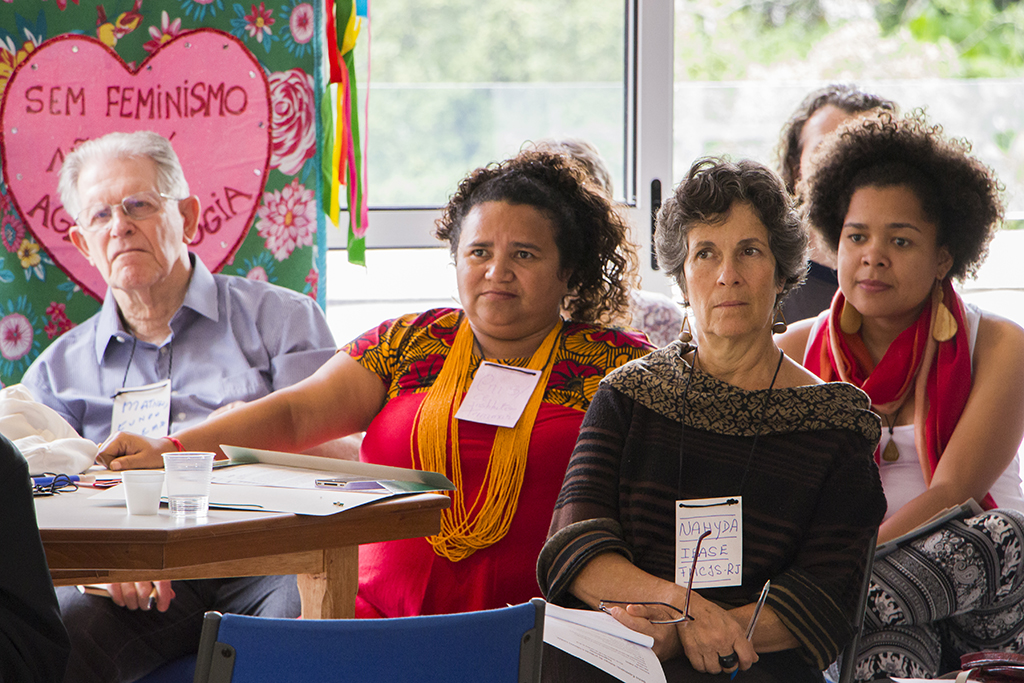
(Photo: Rosilene Miliotti/FASE)
He also warned, however, that the system is now imposing new frontiers: “Capitalism and colonialism have no compassion at all. When victories for common territories go beyond the conceptions of individual property, they come up with a new order through false forms of protecting nature. They may even allow land to be held in common, but whatever is found on that land cannot be free.” In other words, trees, waterways, minerals and other common goods in protected territories, such as indigenous lands, quilombolas and environmental conservation units, are still being targeted by the market, even in the 21st Century.
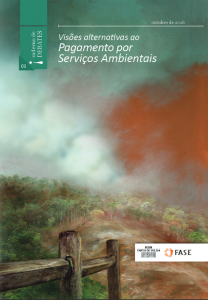 German researcher Jutta Kill, from the World Rainforest Movement (WRM), also warned about a new threat to the commons. “It has different names. People may call it nature economics, green economics or the commodification of nature. These are all terms for the same phenomenon, but none really describes what is happening. One danger I see is that it can sound like a good idea to value nature; but innate value is not the same thing as market value. We must be careful not to twist the language. They’re saying it’s no longer a problem to destroy nature, because you can offset the damage somewhere else. The outcome, though, is more destruction,” she concluded.
German researcher Jutta Kill, from the World Rainforest Movement (WRM), also warned about a new threat to the commons. “It has different names. People may call it nature economics, green economics or the commodification of nature. These are all terms for the same phenomenon, but none really describes what is happening. One danger I see is that it can sound like a good idea to value nature; but innate value is not the same thing as market value. We must be careful not to twist the language. They’re saying it’s no longer a problem to destroy nature, because you can offset the damage somewhere else. The outcome, though, is more destruction,” she concluded.
Payments for environmental services (PES) are one of the strategies to promote those so-called “offsets” for the destruction of nature. This issue was discussed in a book recently published by FASE and the Carta de Belém Group, with a number of critical articles on misleading corporate solutions for global warming. The book explains why fighting the green economy and mechanisms that commodify nature, like carbon markets, is another form of struggle for the commons.
[1] Journalists at FASE. This coverage also enjoyed the collaboration of Kátia Visentainer and Nayana Bonamichi, who helped record discussions at the seminar.
[2] The activity was supported by the Boll-Brazil and Ford Foundations.
[3] You will find more photographs of the event here.










